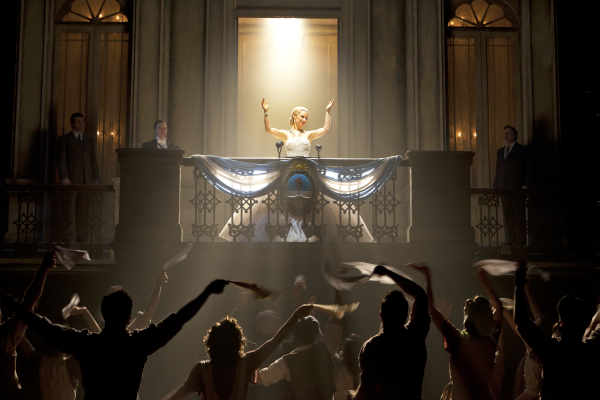
(© Richard Termine)
Evita, currently playing the Pantages Theatre, is the first production in ages that, after the curtain came down, I wanted to run up to the box office and buy tickets for the next day’s performance. This cast, capable of exquisite singing and acting, adds new life to the pop opera, making for an exhilarating event.
Caroline Bowman plays Eva Duarte, the young, ambitious Argentine lass who comforts up to several successful men in her climb for adoration. She finally reaches a “Rainbow High” marrying a ruthless colonel, Juan Perón (played by Sean McLaughlin), and helps him achieve the presidency. Revolutionary Che (played by Josh Young) acts as Greek chorus, commenting and mocking the late First Lady’s climb and eventual physical collapse at the young age of 33.
Caroline Bowman is a revelation in the title role. She may not have original Broadway Evita Patti LuPone’s punch-in-the-stomach belt, but her enunciation is so precise that lyrics can be deciphered clearer than on the Broadway cast album. Her performance is wickedly erotic and slyly humorous. She adds pathos particularly when the once impervious woman loses her battle to cancer. Bowman heartbreakingly projects the desolation of having a world of aspirations ahead but a diminished lifeline. She hits many of those difficult Lloyd Webber notes with finesse.
Young is mesmerizing as Che. With a wallop of a voice and a commanding presence, even with 20 people dancing around him, Young makes you feel for someone who is essentially a cipher, a representative of the creator’s perspective. It is difficult to embody a character who is merely a symbol, which makes Young’s performance more remarkable. As the smarmy lounge singer out of his league with the sexual leap-frogging Eva, Christopher Johnstone is silly-fun personified. He almost makes you feel sorry for the lothario. McLaughlin has the less showy role as Eva’s husband, who quickly realizes he is her right hand instead of the other way around. His booming voice is perfect for a world leader.
To call the ensemble a triple threat does not even begin to laud how accomplished they are at acting, singing, and dancing. Every moment, you believe each individual is a vital part of the storytelling. For example, during the song “And the Money Kept Rolling In,” as Eva hands chorus members cash, their reactions are neither blasé nor overemoting. It is credible that these are peasants holding more money than they'd earn in a lifetime.
Rob Ashford’s choreography is not just accomplished as dance; it is lovemaking. The dancers move like they are in a passionate liaison. Their movements are precise and vigorous. Ashford uses Lloyd Webber’s Latin rhythms to sexualize the tango, waltz, and other standard dances.
Coincidentally, or purposely, director Michael Grandage dresses the younger Eva to resemble Joan Crawford in her early melodramas, an apt correlation. Both Eva and Joan’s characters started at the bottom and clawed their way up by any means. Grandage utilizes all the stagecraft at his disposal to create mood. The lighting design by Neil Austin casts engulfing shadows and fog on the actors, and showers light down like a heavenly glare on Eva during her famous balcony scenes.
The crowds outside the Casa Rosada cried “Eva Perón,” and so did the audience inside the Pantages. This Evita Perón deserves the fervor.









